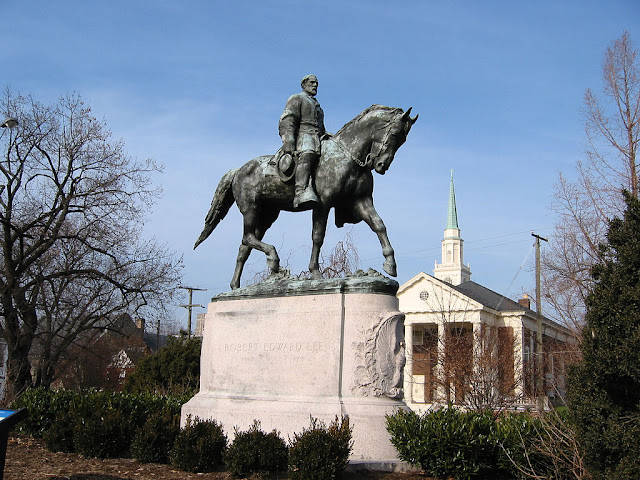 |
| Robert E. Lee statue in Lee Park / Photo: Cville dog / Wikimedia Commons |
This article and podcast appeared on WMRA.org.Charlottesville City Council voted 3-2 on Monday to sell to the highest bidder the Robert E. Lee statue that has been the subject of so much controversy. In February, Council had voted by the same margin to remove the monument from Lee Park – a controversial vote that spurred a lawsuit against the City Council, limiting its action for now. WMRA’s Marguerite Gallorini reports.MAYOR MIKE SIGNER: Okay. Good evening everyone. Calling this meeting of Charlottesville City Council to order.Three main options for disposing of the Lee statue were on the table before City Council on Monday evening: auction; competitive bid; or donating the statue to a government or non-profit entity.Ben Doherty is a supporter of the removal of the statue. At the beginning of the meeting, he expressed his frustration about how slowly things have moved, in his view.BEN DOHERTY: You may give excessive weight to the misguided legal arguments presented by the group of Confederate romanticists in their lawsuit against the city. These are all excuses. Respect the 3-2 vote of the City Council and work with your colleagues to move forward as quickly as possible in removing this racist statue from our midst. Thank you.The lawsuit he refers to was filed in March by the Monument Fund and other plaintiffs, including war veterans, or people related to the statue’s sculptor Henry Schrady, or to Paul McIntire, who granted the statue to the city. The plaintiffs allege that the city violated the Code of Virginia section that protects war memorials, and the terms according to which McIntire granted the parks and memorials to the city. While it might not be liked by removal supporters, the lawsuit has to be taken into account, as City Council member Kathleen Galvin reminded the audience.KATHLEEN GALVIN: The next step, I believe, will be a public hearing on the plaintiffs’ temporary injunction request. In the meantime, Council cannot remove the statue until a decision is made about the injunction. Council can also not move the statue until the case about moving the statue is decided in court. No one knows what the time frame is.What they could do for now though was vote on removal and renaming plans. Councilor Kristin Szakos reads the motion, agreed upon in a 3-2 vote:KRISTIN SZAKOS: The City of Charlottesville will issue a Request For Bids for sale of the statue and will advertise this RFB -- Request For Bids -- widely, including to organizations responsible for sites with historic or academic connection to Robert E. Lee or the Civil War.Some of the criteria are that…SZAKOS: The statue will not be displayed to express support for any particular ideology; the display of the statue will preferably be in an educational, historic or artistic context. If no responsive proposals are received, Council may consider donation of the statue to an appropriate venue.As for the second motion of the night, they also voted unanimously to hold a contest to select a new name for the park.Charles Weber is a Charlottesville attorney, a former Republican candidate for the City Council, and a plaintiff in the case. As a military veteran, he has a special interest in preserving war memorials.CHARLES WEBER: I just think war memorials are very special monuments to those who actually have to go and do the fighting; that they're not necessarily political statements, they're just sort of a tribute to the people who did it. “Stonewall” Jackson and Robert E. Lee were military men and fought the war, they were not the politicians.In particular, Weber points out that the lawsuit is about keeping elected officials accountable:WEBER: I think all of us, on both sides of that debate, the political debate, have a vested interest in making sure that our elected officials don't violate the law in pursuing a political agenda, so in that regard I think this lawsuit is fairly universal.Author and human rights activist David Swanson -- who supports the City Council’s decision -- sees it in a different light.DAVID SWANSON: Any legal restriction that purports to deny the city that right should be challenged, and should be overturned if necessary. A locality ought to be able to decide what it wants to memorialize in its public spaces. There ought not to be a ban on removing anything related to wars any more than a ban on removing anything related to peace. What a prejudice to put in place!
Download the podcast on Through Gallo Eyes.









